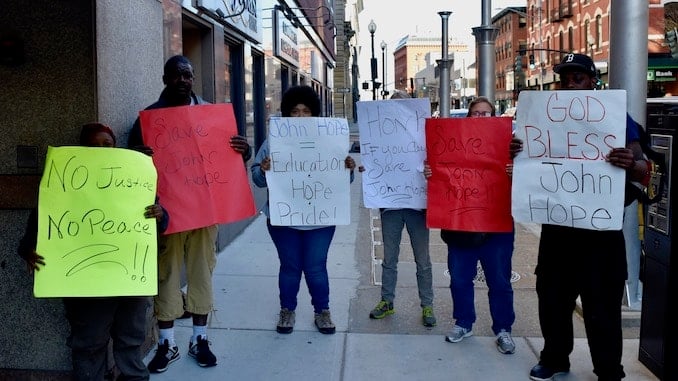Wangari Maathai Community School refuses to answer community concerns about John Hope Settlement House
Outside the board meeting for the Wangari Maathai Community School held Wednesday evening in the law offices of Barton Gilman LLP, about a dozen people held signs, chanted and marched in support of the John Hope Settlement House. Community members had come to express their concerns directly to the board. I was there because when I queried the board, including
April 25, 2019, 4:28 pm
By Steve Ahlquist
Outside the board meeting for the Wangari Maathai Community School held Wednesday evening in the law offices of Barton Gilman LLP, about a dozen people held signs, chanted and marched in support of the John Hope Settlement House. Community members had come to express their concerns directly to the board. I was there because when I queried the board, including the school’s founder, Siobhan Callahan, about the rumors swirling around the proposed deal between the Wangari Maathai board and the John Hope board, I was told that I may get answers by mid-week, next week.
That was today.
Members of the community entered the board meeting, which is covered under Rhode Island’s Open Meetings Act (OMA). Attorney Alex Chiulli, from the law firm of Barton Gilman LLP was careful to make sure that the law was followed by the board in regards to the OMA. The community members were offered a chance to speak to the board, but the board was also clear that they would not be answering any questions the community members might have during the meeting.
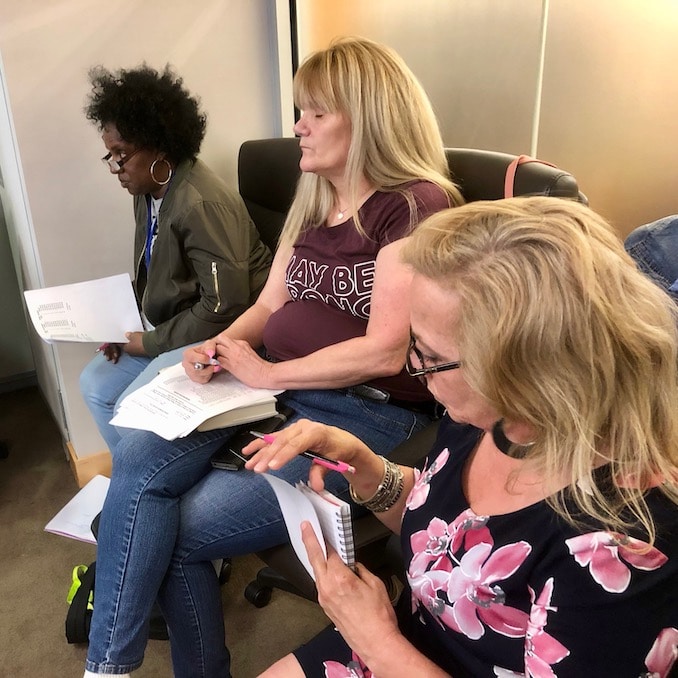
This left the conversation rather one sided, so I’ll give a gist of what was said here:
“It’s not that we are opposed to the charter school,” said Suzette Cook, a South Side Providence community activist who co-organized the event to save John Hope last week at the South Side Cultural Center. “We would like to be able to support you in any way that we can, however we do not, under no circumstances support the way in which you guys went about doing this, without really giving the community a say in how we felt, and not realizing how much [John Hope] really means to us.
“This is a community center that is a home to a lot of us, our children have been raised in there.”
Lisa Scorpio, who co-organized the community meeting last week with Cook, said, “The way you rolled this out – I looked at what you’re supposed to do for community outreach – and you didn’t do it. It makes us feel like you don’t care, and it looks like you don’t care, because you laid out things you would do to notify the community – things like community meetings – you didn’t do any of that.
“You are trying to take over a community center that’s been there almost one hundred years,” continued Scorpio. “And by the secret way that you’ve done it, I have a feeling that you knew how important it was to the community, because if it was nothing, you would have just done it out in the open. But it was all a big secret, and we wouldn’t have known anything if it wasn’t required by law that you have that Department of Environmental Management meeting.
“It’s going to be very upsetting for you people because we’re going to be out there when school’s going on. You need to rethink what you’re doing,” said Scorpio.
“This doesn’t surprise me,” said Sheila Wilhelm, long-time community activist and one of the founders of DARE (Direct Action for Rights and Equality). “None of this surprises me. The subtleness of speaking of the ‘West Side’ – nobody renamed the West End the West Side until gentrification. We live in the West End. John Hope is located in the West End. The theme of John Hope is ‘The Pulse of the Neighborhood’ and that’s what it is. It’s not just a theme and it’s not just a motto. John Hope is the pulse of the neighborhood and the heartbeat. We have kids who were raised there. Grandkids.
“You’re attempting to go in and disrupt, but we will disrupt, and I’m real good at disrupting,” continued Wilhelm. “We all are real good at making people uncomfortable. I’m not totally opposed to charter schools, but I am opposed to invasions, and sneakiness. The only reason I think you tried to sneak through the backdoor – and backdoors are not comfortable – is because you knew that there would be a problem. You maybe didn’t know how big it would be, but you knew people wouldn’t be happy.
“You spoke about outreach. In what community did you speak out? Because it wasn’t ours,” said Wilhelm.
The Wangari Maathai school has already held a lottery for admission. Only one child has been admitted from the 02903 zip code where John Hope is located.
“No one going to your school from John Hope, not one kid, not one parent, found out about your lottery,” said Cook.
“I’d like to know what race your students are,” said Scorpio. “I bet the majority is white, even though the majority of Providence isn’t white.”
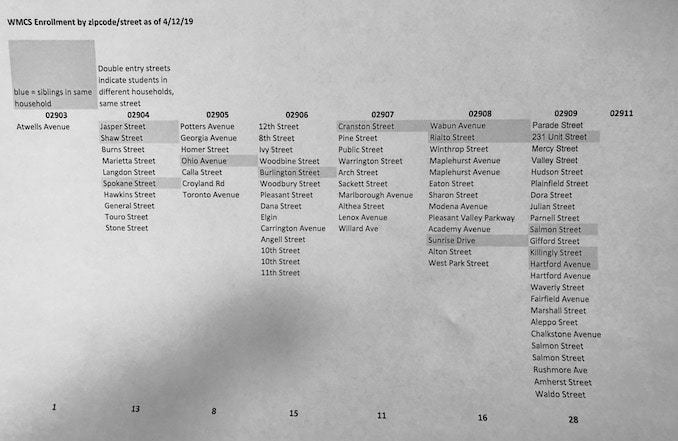
Servio, the third co-organizer at last week’s community meeting, also had questions for the board. “I’m wondering about the details of the contract or possible contract between Wangari and John Hope. Where is that contract right now, and also, I’m calling on you all to not sign that contract and to reconsider your location,” he said.
“You guys had the meeting [with the John Hope Board] without the board having a quorum,” added Cook. “So how can you move forward with only a couple of board members being there?
“What we’re asking is that you find yourselves another place to go so that we can build build our community back up the way it should be and bring our own programs to John Hope, the way it used to be and remove the board that’s there because it’s apparent that if they were the right people, we wouldn’t be in this room right now,” said Cook.
“We have an attorney too,” said Scorpio.
“And we’re going to fight this to the bitter end,” said Cook.
“There’s some things at John Hope that shouldn’t be going on, and I feel that you folks are stuck in the middle,” said community member Valerie Clement, a mother and grandmother. “The John Hope board did all these deals without even letting us know. I backed [board member Anastasia Williams] from the beginning, but now she’s flipped on us. Me and her were friends but you don’t do that to people. You don’t do that to people who voted for you thinking you had our best interest.
Williams, said Clements, “sits on the board [as a member] but she’s really running the board. Anastasia Williams is a member of the Rhode Island House of Representatives.
“We only have that one thing [John Hope] left,” said Clements. “Everybody’s taken everything from us. That place is for the community. We need places for kids to go to not be shot. We have a problem with kids being in the street and not knowing what they’re doing with themselves. We don’t have a problem with change, we have a problem with not being included in the change,” she said.
“One more thing,” added Scorpio. “For the last year a true community organization has been trying to rent space in John Hope. Now we know why nobody would return [that organization’s] calls, because [Anastasia Williams] was working with you guys. So it’s not like we don’t have people who want to use that space.
“We don’t need you, we don’t need your money and we don’t want your kids,” added Scorpio.
“My great aunt and great uncle were married at John Hope. I was brought up in John Hope. Six generations of my family have been brought up in John Hope,” said community member Dolly Alexander. “It’s the only thing we have left as a black community.”
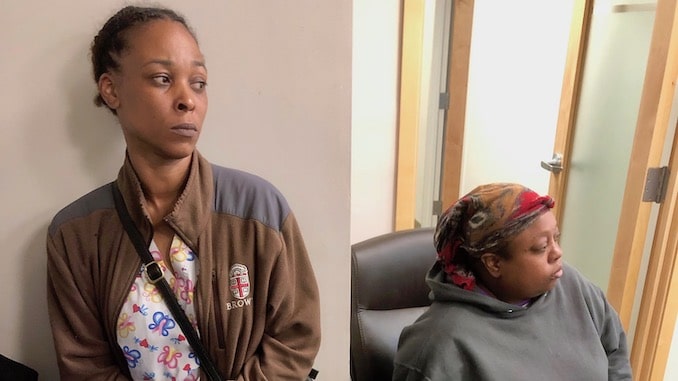
After the community finished with public comment, board chair Karla Vigil addressed them by recalling her days playing ball at John Hope as a youth, but she declined to answer any of the community member’s concerns.
“I just want to say I see you, I hear you. I appreciate and admire your passion that you have for your community, that you have for John Hope,” said Vigil. “What we’re going to ask is to give us an opportunity to take in your thoughts, the challenges that you’re facing, so that we can strategically think about how to share what we’re really doing. I’m not going to respond to all the comments that were made that are not accurate, but you will be finding out what’s been going on very soon.”
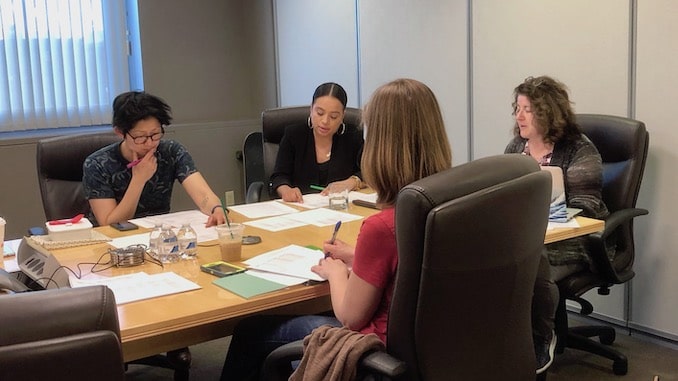
As it was, the Wangari Maathai board declined to answer any of the questions or concerns posed by the community. The board voted to issue a 2-3 line statement on Friday April 26, followed by a longer statement a week later, on May 3. May 3, it turns out, is the day that the Wangari Maathai board will be finalizing their contract with the John Hope Settlement House board, obviating the ability of residents to resist the planned takeover.
After the meeting was over I was approached by Attorney Chiulli and asked if I was with the media. I told him I was. I expressed how frustrating it was to not be able to get answers from the board.
“It’s not that we refuse to hear the questions,” said Chiulli, “I don’t know if we have understood where the questions are coming from. And I don’t speak for the board.”
“I’ve never been in a situation where a board doesn’t even want to know what the questions are that I’m trying to ask before telling me that they are not answering any questions,” I said.
“I don’t know that that’s been explicitly communicated,” countered Chiulli.
As the board members packed up their things, I addressed the board, asking if anyone could answer some questions. They all looked startled and declined my invitation.
“When you say there are lots of false rumors and statements going around, I can’t exorcise those rumors because no one on this board will talk to me,” I said. “When I reached out last week, I was told no comment, until mid-week next week. That’s right now.
“Now I’m hearing there will be a short statement on the school’s website Friday and a longer statement on May 3, but I’m also hearing that by May 3 the board will be signing a lease to take over John Hope Settlement House.
“If that’s the case then what’s really happening is that you’re stalling for time, to have everything in place so that you can surprise the world with a done deal,” I concluded. “This seems contrary to your earlier assertions of being open and transparent.”
The board left the room without answering me. Their lawyer, who does not speak for the board, told me that I could email the board the questions I want to ask if I chose to, and that maybe my questions would be incorporated into their statement.
“We’re not being obstructionist,” said one member of the board to me as she left.
I emailed my questions to the board. One interesting thing I learned is that some people listed in the Wangari Maathai application currently before the Rhode Island Department of Education are no longer part of the project, do not want the school to take over the John Hope Settlement House, and are writing to the board to have their name removed from the application.
Here are the questions I asked.I’m sure I’ll have more.
- Is the deal with John Hope scheduled to be finalized on May 3, the same day Wangari will issue their complete statement?
- Has the board met with John Hope? How many John Hope members were present? Was Anastasia Williams present, and has she been leading the conversations between the two boards or taken a large part in negotiations?
- What is the racial makeup of the students so far accepted?
- When was the first lottery for admissions held, and how was this lottery conducted, given that at the time of the lottery no location for the school had been determined?
- The zip code of the John Hope is 02903. Only one student from that zip code has currently been accepted at the school. Is this evidence that local outreach hasn’t been extensive or as advertised in your application to RIDE?
- Is this the contract under review between Wangari and John Hope?
- Did Anastasia Williams see this contract during the meeting between Wangari and the John Hope Board?
- Are the Wangari board members aware of John Hope’s importance in the local Black community? Was this ever a consideration, or was it just considered an easy takeover given its somewhat diminished circumstances?
- Who initiated the conversations between John Hope and the Wangari Board?
- Does the Wangari board have a statement or position about gentrification?
- How was the name of the school decided?
- Who speaks for the board?
- Why the silence, paranoia, and lack of openness with the public and the media?
- The second statement from the board is due on the same day (May 3) that the deal between John Hope and Wangari is to be finalized. Shouldn’t many of the questions above be answered completely and openly before the contract is signed?
Uprise RI is entirely supported by donations and advertising. Every little bit helps:
Become a Patron!

